#overlap between autism and hsp
Explore tagged Tumblr posts
Text
Why "You're not HSP, you're autistic!" isn't helpful but actually counterproductive
So first, let me explain my background on this:
I'm a social worker. Communication is my daily tool, especially with people in crisis
I identify as HSP but not as autistic. I have reasons for that.
I'm also a lesbian, and have been active in the queer community for literal decades. This includes discussion about labels, self-identification, labels based in discriminatory thinking, etc.
lastly, I'm acutely aware of intersectionality, internalized biases, and where they can lead us
Next, let me outline who this post is for:
anyone who is convinced of the above sentence (and wants to convince others too)
anyone who is uncertain which label applies to them, but feels like it might be one of the two
anyone who knows they are one or both of the above labels and wants to communicate with others.
I'll put my arguments under the Readmore, so as not to clutter up people's dashes; this is gonna get long. In essence, they boil down to:
You-messages like the above very rarely work.
telling someone their own identity typically doesn't work.
a researcher's ableism doesn't necessarily mean their whole entire body of work needs to be thrown out.
HSP and autism have several overlapping criteria, however that does not mean that HSP equals autism.
Lastly, let me tell you why it's important:
we all, no matter how we label ourselves, seek for tools (self help, therapy, apps, etc.) that will improve our lives. Some of the tools from the Autism Toolbox will work for me, some from the ADHD Toolbox too - but not all of them.
currently, there is another toolbox labeled HSP, and the tools in there are perfect for me. I only found them because I found the label HSP; I did not find them in the Autism or ADHD Toolbox. Maybe one day these toolboxes will be integrated into one, maybe under the autism label, who knows. But RIGHT NOW they are not. Right now, they are labeled HSP or SPS, and those are the terms I needed to search for to find them - no matter that the terms might be badly chose
"you're not HSP, you're autistic" denies that this HSP Toolbox even exists, and so people will not find all the tools that can make their life better.
Okay, here's the long form of my arguments.
You-messages like the above very rarely work.
Most people's gut reaction to being told "You are not X, you're actually Y!" is "who are you to tell me what I am?" or "who are you to tell me that my conclusion is wrong?" Such a reaction is, as stated, not helpful, and usually counterproductive. It puts the person being told "You're Y" on the defensive, and people don't change their mind when they feel defensive.
If you are truly convinced that this person is autistic, it is far more helpful to put this in an I-message, and temper it with a potentiality: "I think/it seems to me, from what you describe, that you could be autistic." And then to follow this up with, for example, a question like "have you ever considered that?" so that they can explain if, perhaps, they have already looked into that, or tell you that no, they haven't, what's your reasoning?
They might still react defensively due to their own ableism against being potentially autistic. But they can tell themselves "okay, that was just this person's opinion, I don't have to listen to them," which is actually a much less conflict-ridden outcome.
telling someone their own identity typically doesn't work.
Let's look at another way of telling someone their own identity: "You're not a gender non-conforming cis woman, you're actually trans!" - how do you, an internet stranger, know? All you have is a few sentences that someone posted somewhere; they, meanwhile, know their own lived reality 24/7 of however many years they've lived with it. Again, this kind of communication leads to defensiveness.
Even if it's true - and that's an important thing to keep in mind.
This person might be trans. That person might be autistic. But unless and until they are ready to hear that, to think about that as a possibility, to test apply that label to themselves and see if it fits? You telling them will do jack shit. Especially in a confrontative You-message. It might even lead to them taking longer to embrace that part of their own identity; out of spite ("just because some random internet stranger said I was doesn't mean I am"), out of fear ("I don't want people to know this about me; am I that easy to clock?"), of out internalized bias against the identity ("I can't possibly be this!").
a researcher's ableism doesn't necessarily mean their whole entire body of work needs to be thrown out.
I see the ableism in Aron's work. And in that of other researchers. Bias against autism is unfortunately still rampant, even in psychology, even in neurosciences. And I understand the pain of seeing that, of being belittled, dismissed, being made invisible. And I further understand the gut reaction to not want to have anything to do with a person who is like that, who does that.
That is not, however, how science works. Science needs to take an objective look at what is presented, check it for biases (among other things), and if found, check whether those biases truly invalidate the entire body of work, or parts of it, and then throw those out and also check if sense can be made of the data/findings without those biases.
That is what further research and peer review is all about, and that is being done right now. This has been the case throughout medical history, as well as all other sciences. Heck, for the longest time (including even today), one form of autism was named after a fucking Nazi ramp doctor.
Again, I know the pain that bias in science can cause. I've been at the receiving end, I know plenty of people who have been on the receiving end, I see your pain. I understand wanting to be seen, not dismissed. I understand wanting to lash out.
However, when you do so by telling people "you're not HSP, you're actually autistic", the only people that you hurt are the ones who are seeking help, who are vulnerable and in pain themselves. It wasn't all that long ago that especially girls and women (or people perceived as such by parents, teachers, doctors) were told "You're not autistic; girls can't be autistic." It hurt them. It denied them access to help that they sorely needed. Don't perpetuate that, please - even if you are truly convinced that this person is, in fact, autistic: please refer to the above two bullet points to understand why telling them in that way won't help.
HSP and autism have several overlapping criteria
and it is possible to be both, it is possible to identify first as one, then the other, and it is possibly to mistakingly think you're one when you're actually the other. However that does not mean that HSP equals autism in every single case - not according to current psychological and neurological knowledge.
I score well below the threshold for every single autism test. Like, it's not even close. Even the ones that test for typically-overlooked autism criteria, even the ones that test for how autism presents in women, all of them. The experiences that autistic people describe, of studying social interactions until they can mimic them perfectly, know what to say and how to react because they've seen other people do so and can replicate that - none of that is me. By all criteria known to current science, I am not autistic.
I have, however, undeniably a high sensitivity to external input, sensory processing sensitivity, funnel not filter, high-wired brain, however you want to name it. I don't care what it's called; all I care about is that I understand how I work, how my brain works, so that I can finally get the bottom back under my feet. That is why I was trying to see if I'm autistic: because that would have helped me make sense of what is going on, of how I feel wrong all the time; and it would have enabled me to seek out therapy that was actually helpful. I would not have minded an autism diagnosis; I would have welcomed it, precisely because of that.
And it was never the right fit. And god, how that frustrated me. And I know you know that feeling, of looking at this box and that label and this study and that doctor, and they all tell you "no, this isn't you, not precisely." And you know that you don't fit in with society, that you're different than other people, who seem to fit in so easily, who go through life so blithely when you simply can't, and you just wanna know why that is and how to change it, how to make things so that you can go through life blithely too.
The overlap between HSP and autism is large.
And maybe, further down the line and the years, science will come up with a concept that combines autism and HSP or SPS or whatever they call it currently. And when that time comes, I'll embrace that concept just like I'm embracing HSP as a concept right now, just like I would have embraced an autism diagnosis. But until that happens, we need to keep both of these labels, diagnoses, whatever you want to call them, open and available for people.
Because while the overlap is large (just like autism and ADHD have some overlap), it isn't a circle; it's a Venn diagram with some communal and some separate aspects. And I fall into the pool that isn't overlapping with autism. Others don't. Squares and rhombuses can coexist, and so can autistic people and highly sensitive people; I'm 100% convinced that plenty of accommodations, tools, helpful tricks work for us both.
But some of them are not fully the right fit, and that is important. In the end, that is what this is about, and why we need both terms, both concepts, and why conflating them isn't helpful: the people who fall under any of these diagnoses need to find the correct help, the correct tools for living their lives in the best way possible. The way I need to arrange my life, the strategies I need to develop and the accommodations I need to implement, have lots in common with what an autistic person might need - lots, but not everything. Just like different autistic people will need different things. And people with ADHD need different things (and also some of the same things). But when you point me only to the Autism Toolbox, I will not find everything I need, just like an ADHD person won't. And that makes my life harder than it needs to be.
Currently, I find the tools that I need in a box labeled HSP. I don't care if they stay in there, if the box gets relabeled, if it gets integrated into the autism toolbox. All I care about is that I have access to them, that other people who need the same tools have access to them. I have started to work with an HSP coach, who I found because I found the label HSP, and when I tell you that my life has massively improved since then, I want you to hear that.
When you say "you're not HSP, you're actually autistic," one of the things you're doing is you deny people access to the tools they need.
And I won't stand for that.
94 notes
·
View notes
Text
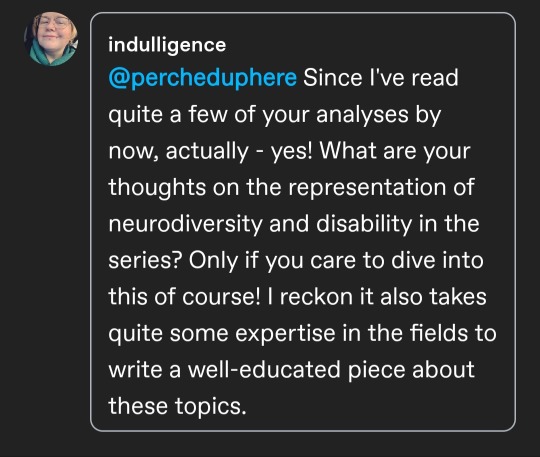
LET'S TALK ABOUT NEURODIVERSE AND DIFFERENTLY-ABLED/PEOPLE WITH DISABILITIES REPRESENTATION IN THE LOKI SERIES
Thank you so much for your patience and your amazing ask, @indulligence! Special thank you, as well, to all the gif artists who made this meta possible.
I've been champing at the bit to get to this one, and I finally made it!
As a disclaimer, I am not a doctor, and I recognize we should take care in pseudo-diagnosing fictional characters as we don't want to perpetuate stereotypes of our neurodiverse and differently abled/people with disabilities communities. Having said that, if interpreting a character as being neurodiverse and/or differently abled/having a disability brings you comfort and joy, you should certainly do so! Canon is a sandbox. Fictional worlds and characters are meant to be engaged with for your pleasure.
I do cite a few medical graphic and their sources below. If any of those sources are problematic in any way, please let me know and I can switch out the graphic for one from a better source.
LOKI - ADHD [?]
At first glance, Loki's characterization in Thor 1, Thor 2, and Ragnarok don't seem to present him as having challenges with executive function. He appears to be able to focus and sustain focus, able to organize, and able to sustain effort and process. Loki also has exceptional memory.
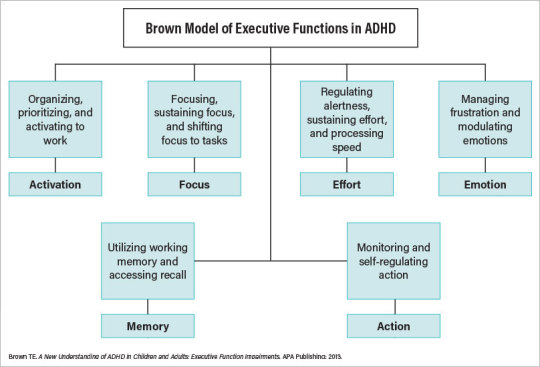
[source]
As for mood, many mood symptoms of ADHD overlap with depression, the latter of which Loki clearly has. Nevertheless, it should be noted that ADHD and depression are often comorbid. He could have both.
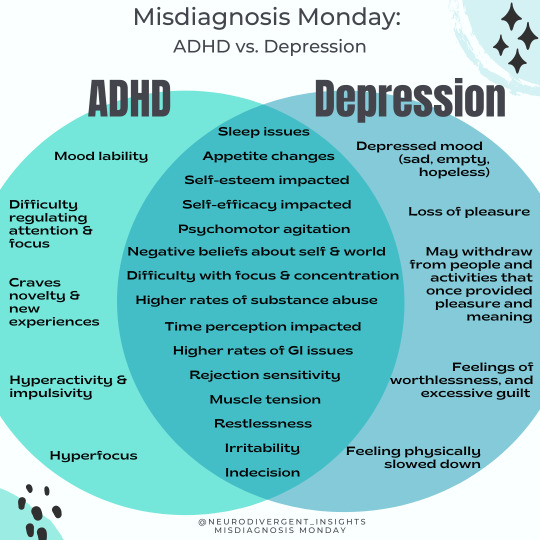
[source]
While memory and effort are not concerns, Loki has consistently shown challenges with impulse control, managing frustration, and modulating emotion. A number of his most consequential choices (i.e. inadvertently directing Malekith to his mother, chasing after Sylvie, etc.) are influenced by his emotional state rather than premeditation. This may suggest that if Loki has ADHD, he leans toward Type 2: Impulsive/Hyperactive:
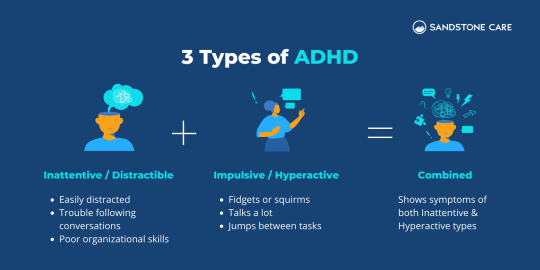
[source]
His characterization in the Loki series changes somewhat to include more hyperactivity and swings between hyperfocus and difficulty regulating attention and focus. Loki gesticulates, fidgets, and moves a lot more in the series than the movies. He also talks much more quickly when excited.


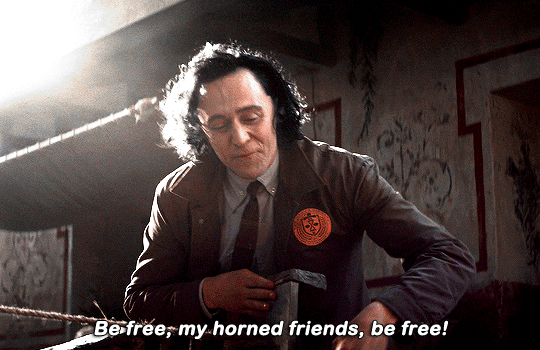
Do I think these changes were intentional? I honestly have no idea. Whatever the case, I think it's lovely that the Loki who becomes the most powerful hero in the MCU is also the version that demonstrates a higher likelihood of being diagnosed with ADHD.
MOBIUS - NEUROTYPICAL / HIGHLY SENSITIVE PERSON (HSP) [?]
I think Mobius, for the most part, is neurotypical. Even with Loki being his special interest/hyperfixation, he doesn't exhibit the other symptom criteria to meet a Level 1 Autism diagnosis, an Obsessive Compulsive Disorder diagnosis, or an Obsessive Compulsive Personality Disorder diagnosis.
He may, however, be a Highly Sensitive Person (HSP).
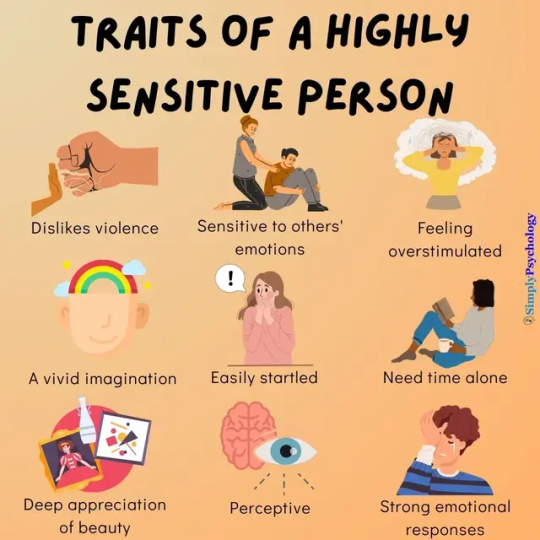
[source]
Mobius's empathy for others, perception of behavior, observation of circumstances, and deep appreciation for beauty (particularly when it comes to the beauty of people) are exceptionally strong.
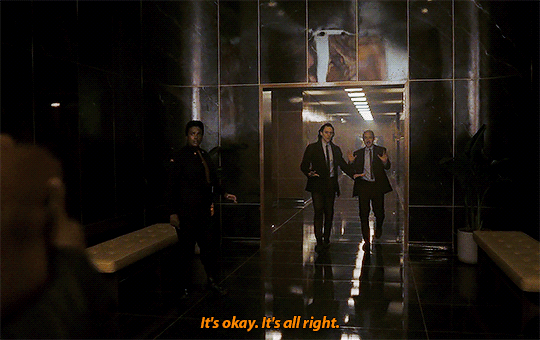
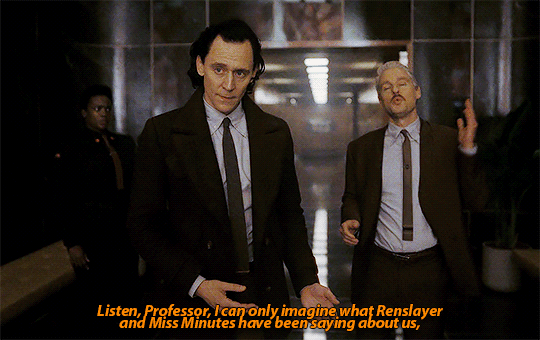

NOTE: Even when the stakes are dire, he's still willing to give Ravonna and Miss Minutes the benefit of the doubt. He really is a sweetie pie. A sweetie pie who can and will slap you if you deserve it.
I think Mobius may mask his strong emotional responses regularly in order to be able function in the TVA. There were only two incidents, when he was unable to suppress his feelings, and those outbursts were remarkable:


That said, Mobius doesn't quite meet the other symptoms of HSP, which include sensitivity to stimuli, being easily startled, and aversion to violence. As we see in the series, Loki's antics don't overwhelm or startle him, and he has no issue with torture when he deems it necessary.
It is possible that Mobius may have Acquired Neurodivergence post-series as a consequence of trauma in the series finale. At present, we have nothing in canon to support this, but many fanfics show Mobius struggling to cope with the loss of Loki, his home, his family, and his identity. This severe level of loss can cause a variety of mental health conditions and disorders that may impact Mobius's future ability to function in a neurotypical way.
SYLVIE - ACQUIRED NEURODIVERGENCE [?]
I've written about Sylvie's sexuality here, and I think some (if not most) of her quirks when it comes social interaction, emotional intimacy, and physical contact may be explained by trauma. As such, I think some of her behavioral symptoms, which can be mistaken as autism, is actually the result of PTSD causing structural changes to her brain. Loki likely has this as well.

Like O.B., she is verbally blunt and appears to demonstrate lower empathy, especially with those she disagrees with.

To be clear, this doesn't mean Sylvie doesn't have empathy. She does, as can be seen in the gif above. What I mean is, her empathy and ability to demonstrate it are generally low throughout the series. This is likely a psychological defense mechanism. Having lowered empathy is advantageous if growing up in apocalypses is the only means of survival. Every friend and lover she's ever had is either dead or will die because of those apocalypses or because of who she is to the TVA.
Unlike O.B., Sylvie initiates social interactions and develops friendships more easily. Sylvie has acquaintances, if not friends, in John (McDonalds,) Eric (bartender), and Lyle (record shop). NOTE: You can tell the writer is a man when the bias in creating side characters skews male instead of female. Sylvie should at least have ONE girlfriend in her 1982 timeline, but she doesn't.
OUROBOROS (O.B.) - LEVEL 1 AUTISM [?]
Here he is! Here is our favorite neurodiverse ray of sunshine! Our autistic cinnamon roll! The MVP of season 2!

Now, I have mixed feelings regarding how people on the autism spectrum are portrayed in media. While they are often shown as socially awkward, they are also shown to be exceptionally brilliant in their area(s) of interest. This is quite flattering and often true in real life, yet I worry that this creates a stereotype that not only are all autistic people "geniuses", they are also geniuses in a way that is useful to a capitalistic society. That expectation isn't healthy and perpetuates the belief that a person is only valuable if they are useful. Further, it is a narrow portrayal of the autism spectrum. It is important to have representation across that spectrum instead of stopping at Level 1.
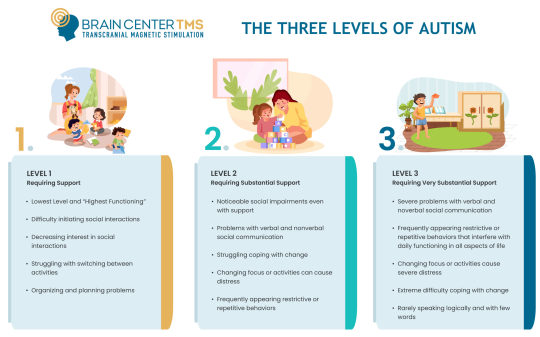
But I don't like being a Debbie Downer, so let's focus on the good representation that can be found in O.B.!
O.B., in a lot of ways, reminds me of Entrapta from She-Ra and the Princesses of Power. He doesn't always read social cues correctly, which often plays out as fantastic comedy relief on screen when the stakes are outrageous.
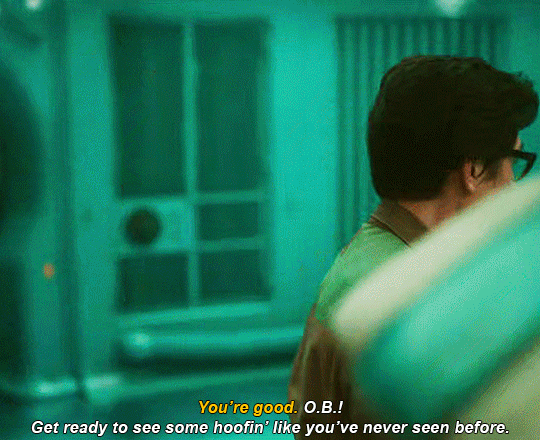
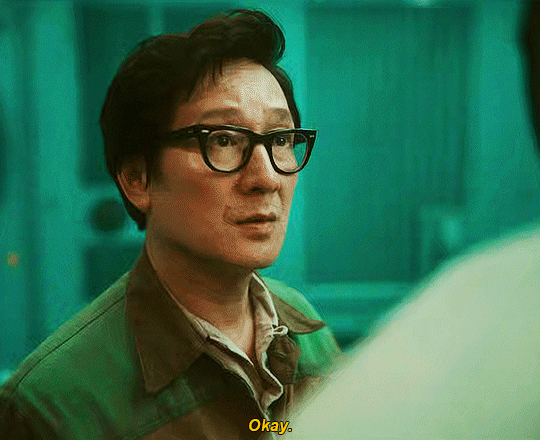
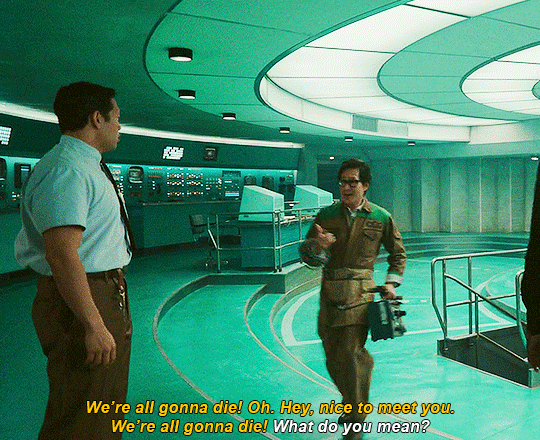
Like Entrapta, his science and engineering aptitude are nearly unmatched if not for Victor Timely. However, the hyperfocus O.B. exhibits does have negative consequences, as exemplified when he explains he lost his job and wife due to dedication in creating a TemPad prototype. Despite these losses, O.B. is resilient and looks forward to what comes next (another possible symptom of his neurodiversity).

I love that O.B.'s neurodiversity allows him to believe Loki when Loki finds him on his branched timeline with his "crazy story". It is also what allows him to see the patterns in Loki's timeslipping and propose, with confidence, that timeslipping can be controlled.
He is also a very good friend. Though he might not be the "huggy" type, he always makes an effort to find concrete solutions to big problems. I would say that O.B. is Loki's second closest friend in the series after Mobius.
I can't tell if it's O.B.'s autism or O.B.'s inner asshole that's fucking around with Loki in this scene. Not once but twice! Either way, I love it (and the fact that Loki resists the temptation to zap him back).


CASEY - LEVEL 1 AUTISIM [?]
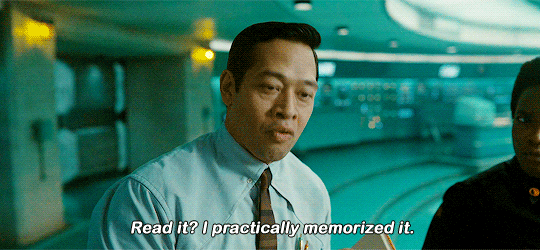
What I appreciate about Casey is that if he is interpreted as autistic, he is not a super genius. He is still quite gifted, but I think he represents where a good number of level 1 autistics actually land in life. I feel this is a much healthier portrayal and balances out O.B.'s genius representation nicely.


NOTE: Look how cute they are! They must be protected at all costs.
I am also so happy that Casey and O.B. found friendship in each other. We have to give B-15 (Verity) credit for this. The only reason they met at all is because B-15 had the presence of mind to think of Casey to help O.B. with the Loom debacle.

Together, they become unstoppable, but there's one more friend who completes the Science Club Trio ...
VICTOR TIMELY - SPEECH IMPEDIMENT/LEVEL 1 AUTISM [?]
Since I've discussed autism interpretation and representation at length with O.B. and Casey, I'm going to concentrate on the portrayal of Victor Timely's speech impediment.

I also have mixed feelings regarding the media portrayal of people with speech impediments. This medical condition is often used as a means of showing a character is "meek" or "harmless". I don't doubt that this character feature was chosen for that exact purpose, to immediately contrast Timely against HWR in the quickest, most efficient way possible. Unfortunately, this kind of narrative "shortcut" leads to stereotyping people with speech impediments accordingly.
It's a good thing, then, that Loki series takes the time to add some depth to Timely's character. Yes, he has a speech impediment, but he is also very willful, crafty, and brave.
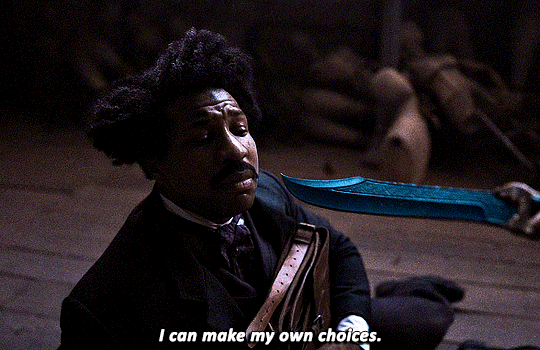
#loki#mobius#lokius#loki series#loki season 2#loki meta#my meta#sylvie#ouroboros#ob#casey#victory timely#hwr#neurodiversity#neurodiverse#neurodiverse representation#speech impediment#loki analysis#my analysis
46 notes
·
View notes
Text
You know one thing I appreciate being able to find when I get curious about comparing different types of neurodivergence? Actual reliable information.
I freaking LOVE being able to see comparisons like this.
Yes, there's some external behavioral overlap (like how there's external behavioral overlap between autism and ADHD, or ADHD and anxiety, or C/PTSD, and on and on and on), but getting to have that acknowledged and see it clearly stated 'These bear some similarities and these are the ways they're different, and just because they look similar externally doesn't mean they're the same thing; the different source points for these overlapping behaviors point to different support needs that won't be met if they're treated as all the same thing when they're not' is both immensely satisfying and deeply fascinating.
(Especially since trying to look up comparisons between allistic versus autistic hyperlexia usually results in me slamming into a wall of 'autistic hyperlexia is the only form of hyperlexia that exists (pay no mind to the sources that briefly mention allistic hyperlexia before moving on to the "problem" of autistic hyperlexia) and autism and anything associated with it is supposed to only exist in children'-- which is infuriating as hell. 🙄)
That said, I will say I didn't appreciate that some of the results I came across took that patronizing 'autism is a problem and autistic people have tantrums' perspective. Way for those authors to show their ableist bullshit. (At least one of those articles I linked briefly toes that line for a sentence or two, but they moved past it quick.)
Still, I am so damn glad there's information that actually gives a clear-- AND ACADEMIC AND PEER-REVIEWED-- comparison of how autism and being an hsp are similar and different.
#HSP#autism#neurodivergent#neurodiversity#my life#comparison of similarities and differences between types of neurodivergence#without contempt or trying to put one on a pedestal over any others my beloved
24 notes
·
View notes
Text
OP is silencing and gaslighting people that are correcting them (some of which have HSP but not Autism) which is dangerous because I see people in the tags actually believing OP.
IDK where OP got their information from, and i’d be open to their sources, but HSP is NOT autism. having HSP isnt a promise that you have autism. HSP is NOT synonymous with autism. HSP is a combination of ‘symptoms’ or traits, so it often overlaps with multiple conditions. Similar to how many ADHD and Autism characteristics overlap although they are not the same.
Again, there is an OVERLAP with some HSP and Autism traits, but they are entirely different. It’s not uncommon for people with Autism to have HSP, but a majority of people with HSP do not have Autism. The belief of otherwise is a result of past stigma and poor defining/research of Autism that grouped people with ADHD (formerly ADD), all levels of Autism, OCD, and HSP together. Brain mapping/imaging science has PROVEN to us that HSP and Autism are distinctly different.
Autism is a disorder, HSP is not.
Multiple sources from doctors/researchers/advocates below:
“We also hold concerns about highly sensitive people being misdiagnosed as autistic by professionals who are not trained in assessing temperament and high sensitivity, which may lead to poor self-understanding and mismatched supports.”
Misinformation is dangerous to everyone involved. Even if you wanna say you aren’t referring to the literally “HSP,” you put it in the HSP tag and made no clarification that you were not talking about HSP and told HSP individuals that they were uneducated and don’t know about the root of HSP when informing you about a very dangerous misconception that leads to improper diagnoses.
you're not a "highly sensitive person," you're autistic
#and please do not tell me that i am not educated on this like you have said to others#this is literally my field of study#never said i dont know the history of it#the history of adhd is that it was terribly defined and labeled as add… that doesnt mean adhd didnt exist or#nor that add isnt technically still a valid term just under adhd as inattentive adhd.#just because hsp was used in an ableist manner doesnt change the fact that hsp is very real and is not identical to autism..#literal brain scans prove this.#autism#autistic#hsp#mental health#asd#also
599 notes
·
View notes
Text
My autistic research
Well, I wanted to get autism tests available, because I've been suspecting neurodiversity for a long time. If the results do indicate autism, I want to go to my psychiatrist with it.
By the way, I noticed that the results often differ depending on the gender. Of course, without taking into account non-binary people. But since I am afab, and was brought up anyway, I usually look at this threshold as well.
So let's start!
My markings:
🟣 - autistic score
⚪️ - neurotypical score
Autism tests
Short Autism Quotient - AQ-10
Scores 6+ indicate you might be autistic
Scoring range: 0–10
My score: 7 🟣
Autism Quotient - AQ-50
Scores 26 or greater indicate you might be autistic
80% of autistic people score 32 or higher
Most non-autistic males score 17 on average
Most non-autistic females score 15 on average
Scoring range: 0–50
My score: 33 🟣
Systemizing Quotient–Revised - SQ-R
Scoring range: 0–150
Threshold score: 75↑
Mean scores. Autistic man: 77.8. Autistic woman: 76.4. Neurotypical man: 61.2. Neurotypical woman: 51.7.
My score: 81 🟣
Ritvo Autism Asperger Diagnostic Scale – Revised - RAADS–R
Scoring range: 0–240
Threshold score: 65↑
65+ you are likely autistic (no neurotypical scored above 64 in the research)
<65 you are likely not autistic (97% chance of not being autistic)
My score
RAADS-R: 144 - 🟣 The mean score of autistic people; strong evidence for autism.
Social relatedness: 49
Language: 14
Sensory/motor: 46
Circumscribed interests: 35
The Aspie Quiz (i hate that phrase...)
The Aspie Quiz is made up of 240 questions that fall into five domains: Talent, Perception, Communication, Relationships, Social.
The Aspie Quiz outputs a neurodiverse and a neurotypical score, indicating that the participant is neurodiverse, neurotypical, or mixed.
Your neurodiverse (Aspie) score: 0–200
Your neurotypical (Non-autistic) score: 0–200
The following are the possible results based on your scores:
Very likely Aspie (neurodiverse) — Your Aspie score was at least 35 points higher than your neurotypical score.
Very likely neurotypical (neurotypical) — Your neurotypical score was at least 35 points higher than your Aspie score.
Both Aspie and neurotypical traits (mixed) — The interval in-between (less than 35 points difference).
My score
Aspie: 130 na 200
Neurotypical: 87 na 200
Difference: 43

Camouflaging Autistic Traits Questionnaire - CATQ
Scoring range: 25–175
Threshold score: 100↑
My score:
Repetitive Behaviours Questionnaire - RBQ-2A
Scoring range: 20–60
Threshold score: 26↑
36 average autistic score
25 non-autistic score
My score:
There is also EQ test (Empathy Quotient), but I have made a separate section for empathy tests below, along with guesswork about my high sensitivity.
Other tests
The psychometric tests below can also offer insight into autism and related aspects (empathy, camouflaging, executive skills, etc.) and co-occurring conditions (alexithymia, ADHD, etc.).
Executive Skills Questionnaire - ESQ
Autistic adults show a decrease in flexibility and planning. Below are listed the executive skills challenges in other categories.
Autistic adults with ADHD: decreased flexibility, decreased response inhibition, and decreased planning.
Non-autistic adults with ADHD: decreased response inhibition.
My score
ESQ: 158
Response Inhibition: 16
Working Memory: 14
Emotional Control: 11
Task Initiation: 14
Sustained Attention: 12
Planning/Prioritization: 15
Organization: 17
Time Management: 15
Flexibility: 8
Metacognition: 14
Goal-Directed Persistence: 12
Stress Tolerance: 10
Lowest
Flexibility: 8 🟣
Stress Tolerance: 10
Emotional Control: 11
Empathy tests
I have a problem with this topic. I thought for a long time that I could not be autistic because I have high empathy. After a while, however, I found out that a lack of empathy doesn't equal autism. It also gives me a clue that maybe I have high sensitivity (HSP). Some of the syndromes and behaviors of HSP and ASD overlap, so would it be all the more possible? I'm not sure, especially since HSP is quite a new topic.
The Empathy Quotient - EQ
Scoring range: 0–80
Threshold score: ↓30
81% of people previously designated Asperger syndrome score 30 or lower.
Most non-autistic males score 42 on average.
Most non-autistic females score 47 on average.
My score: 39 ⚪️
Toronto Empathy Questionnaire - TEQ
Scores above 45 are indicative of above average empathy levels.
Threshold score: 45↓
The TEQ scores exhibited a negative correlation with the Autism Quotient.
Scores 45 or higher indicate you have higher than normal empathy.
The lower the score, the less empathetic you are.
Most non-autistic males score: 43.46–44.45
Most non-autistic females score: 44.62–48.93
Scoring range: 0–60
My score: 48 ⚪️
#autistic#embrace autism#autism test#neurodivergent#autistic feels#journal#resources#actually autistic
23 notes
·
View notes
Note
Does anyone around these parts have any personal accounts of trying to differentiate between autism and being an HSP? I’ve called myself autistic on and off for 5 years now but my therapist suspects HSP more, (but doesn’t discount the possibility of autism and hsp overlapping)
I haven't seen any myself. Can anyone help non?
36 notes
·
View notes
Text
FINALLY, I've seen bullshit posts like that SO often and now FINALLY someone corrects them! Seeing "HSP is just autism" is absolutely bullshit and the result of thinking neurodivergent means "just the overlap between autism and ADHD" like really, it's SO annoying!
Social things are often absolutely intuitive to highly sensitive people - something that's not the case for autistics.
you're not a "highly sensitive person," you're autistic
599 notes
·
View notes